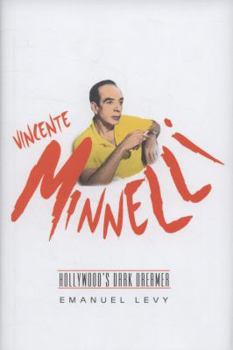Vincente Minnelli: Hollywood's Dark Dreamer
Select Format
Select Condition 
Book Overview
This is the biography of Vincente Minnelli, the famous Academy Award winning Hollywood director and accomplished stage director.
Format:Hardcover
Language:English
ISBN:0312329253
ISBN13:9780312329259
Release Date:April 2009
Publisher:St. Martin's Press
Length:448 Pages
Weight:1.75 lbs.
Dimensions:1.5" x 6.5" x 9.5"
Customer Reviews
5 ratings
Colors of Minnelli
Published by Thriftbooks.com User , 15 years ago
I am an avid reader (and collector) of biographies of movie directors in possession of a library of over 300 volumes. It's kind of shocking to me that your book, which I like very much, is the first chronicle of Minnelli's life. Unlike many bios, yours is paticularily interesting to read for its detailed descriptions of individual films as well as for the more general thesis of how a major artist like Minnelli can take genre movies, such as MGM musicals or a broad Lucile Ball comedy, and still stamp them with his personal vision and style. You make a strong case that in Minnelli's work, there is no separation between style and contents, and that in the good pictures, aesthetics, ideology and morality are in congruence. After reading your book, I revisited Tea and Sympathy, a melodrama that I never cared about before, but paying attention to the specific use of color, shades of blue for degrees of masculinity, or the green dress that Deborah Kerr wears in the seduction scene, proved to be very rewarding. This is not something I would generally do after reading a biography, but your discussion was so interesting and detailed I had to see for myself. Actually think I will enjoy looking deeper into Minnelli's movies, even some the lesser films I've never seen, and watching how his works unfolds.
Elevating Minnelli to an American Auteur
Published by Thriftbooks.com User , 15 years ago
Like Levy, I am an auteurist scholar, and what impresses me most about Levy's informative, and I believe important biography, is his quite persuasive argument that Minnelli should be placed among the rakes of American directors who are genuine auteurs, a distinction which has historically eluded him. In Andrew Sarris's seminal book on auteurism, for example, Minnelli is not included. Levy however, demonstrates that there are both thematic and stylistic continuities in Minnelli's oeuvre that go beyond genre. For example, the examination of gender and sexuality, masculinity and femininity, or more specifically what society perceives to be "real manhood" recur in most of Minnelli's movies, be they musicals, medlodramas, or even comedies, such as Father of the Bride, Designing Woman, and even The Long Long Trailer.
Horray for Hollywood!
Published by Thriftbooks.com User , 15 years ago
The most interesting aspect of Emanuel Levy's informative biography of Minnelli, which I recommend to anyone interested in Hollywood history, is his discussion of how an artist like Minnelli developed and blossomed in the studio system of the 1940s and 1950s. Hollywood is considered to be a mass assembly of movie dreams, a factory for manufacturing fantasies, and yet Levy shows so convincingly that a talented but passive director like Minnelli could only survive and develop in the Hollywood system, and as soon as the studios declined (around 1960), he and many other gifted directors like Ford and Cukor declined too, because they lost the support and resources that the studio provided.
A New Perspective
Published by Thriftbooks.com User , 15 years ago
I salute Levy in dealing with Minnelli's homosexuality in such a discreet, non-gossipy and yet highly relevant way in understanding his work as an artist. I wonder if, as Levy claims, he channeled his sexual and other anxieties into his work in a conscious or subconscious way, though ultimately this question may be irrelevant, because the evidence is right there on the screen. Levy's reading of Tea and Sympathy as a personal work, dwelling on the color codes of masculinity is illuminating. The book is a must-read for all those interested in sexuality and creativity in Hollywood cinema. Another highlight is the chapters on Minnelli's troubled marriage to Judy Garland. It was painful to read how much he loved and sacrificed for her, ultimately becoming a victim of the marriage, personally and professionally, losing major jobs. I was particularly struck by the description of how Minnelli took Judy to her therapy sessions and waited in his car until they were over, then driving her back home. All in all, highly recommended.
Top-Notch Minnelli Biography
Published by Thriftbooks.com User , 15 years ago
As a fan of Minnelli, I was eager to read Emanuel Levy's biography of this distinguished filmmaker. His book is fascinating; Levy does a brilliant job of analyzing Minnelli's work in the context of his life and in doing so putting him in his rightful place among Hollywood's great directors. The book thoroughly details how Minnelli worked, how he collaborated, how his particular cinematic style developed, and his ups and downs in the studio system. Levy does an excellent job in showing why Minnelli should belong to the pantheon of Hollywood directors, alongside Hitchcock and Welles among others, how consistent his cinematic vision is, and how events of his life molded that vision. The lengthy analysis of each Minnelli film is illuminating and clearly illustrates Minnelli's stature as an innovative director both thematically and technically (his mise en scene, camera work, sense of color) especially in the musicals which I know the best. After reading the book I look forward to revisiting the films I know and love with fresh eyes, as well as exploring more of Minnelli's rich body of work in melodrama and comedy.





